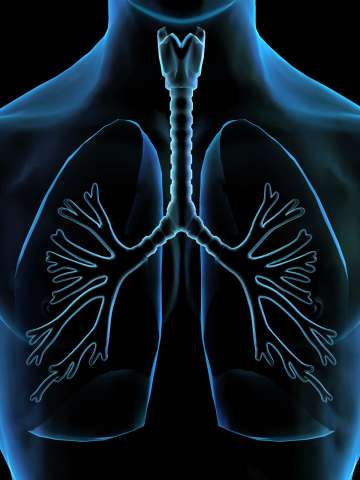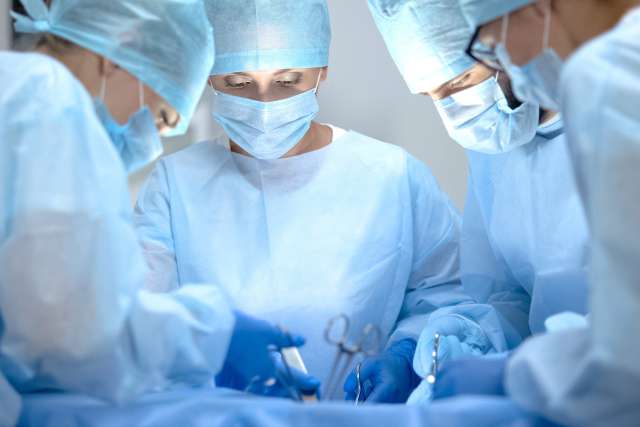Thoracic Surgery
Our thoracic surgeons use advanced techniques and consistently rank among the best in the nation. They utilize a variety of different thoracic surgery types to ensure the best outcomes for the patient.

Why choose UCLA Health for thoracic surgery?
Our thoracic (chest) surgery team is at the forefront of care. UCLA Health consistently ranks among the top hospitals in the nation. This year, U.S. News & World Report ranks us No. 5 in the country for pulmonology and lung surgery.
We use advanced techniques and thoracic treatments, a team approach and patient-centered care. When patients choose us for thoracic surgery, they benefit from:
Multispecialty care: We believe that collaborative care leads to the best patient outcomes. Your care team includes the expertise of specialists in pulmonology, oncology, radiology, gastroenterology and nuclear medicine. This team approach means that we can offer you targeted and specialized thoracic treatment options.
Excellent clinical programs: In our division, we have many specialized programs to treat specific diseases. For example, our Mesothelioma Program is designated as a Center for Excellence in mesothelioma treatment. Our Sarcoma Program is one of the three highest-volume programs of its kind in the country.
Leaders in innovation: In addition to caring for patients, our clinicians participate in multiple research programs and clinical trials. We also have a highly regarded training program where we educate the next generation of thoracic surgeons.
Our services
What is thoracic surgery? Thoracic surgery types include procedures on your lungs, chest and esophagus. Our thoracic surgeons work in multiple clinical programs, including:
Esophageal Cancer and Benign Esophageal Disorders Program: We offer the full spectrum of testing and treatment for esophageal disorders. Our surgeons are crucial members of the treatment team for esophageal cancer, as well as benign (noncancerous) conditions that affect the esophagus.
Lung Cancer Program: Lung cancer is one of the most common types of cancer in both women and men. We collaborate with multiple specialists, such as pulmonologists, oncologists and radiation oncologists to provide excellent care. We also perform research to learn more about lung cancer and find new treatments.
Mesothelioma Program: Mesothelioma is a condition that leads to tumors on the lining of your lungs, heart, or esophagus. At UCLA Health, we have achieved certification as a Center of Excellence in mesothelioma treatment. We are one of only a few centers that offers a surgery called a pleurectomy and decortication, in which we remove tumors while still preserving lung tissue.
Robotic Thoracic Surgery Program: Robotic procedures allow surgeons to operate through small incisions with even more precision and control. At UCLA Health, we have a long history of performing robotic procedures with excellent outcomes. Today, we can use a robotic approach for many surgeries that required a large incision in the past.
Sarcoma Program: Sarcoma includes all cancers that start in your bones or soft tissue. At UCLA Health, we have one of the three busiest sarcoma treatment programs in the nation. Each year, we treat more than 1,000 patients with sarcoma, including about 500 patients who have surgery.
Chest conditions we treat
Our thoracic surgeons offer surgery as a treatment for conditions that affect the lungs and esophagus. Conditions we treat include:
- Esophageal cancer: When cancer cells start in your esophagus, the long, hollow tube that runs from your mouth to your stomach.
- Hiatal hernia: When your stomach bulges up to your chest through your diaphragm (muscle that separates your chest and abdomen).
- Lung cancer: Cancer that starts in your lungs, often occurring in people who smoke.
- Mesothelioma: Tumors that line the tissue (mesothelium) in your heart, lungs, stomach, or other organs.
- Pleural effusion: Fluid buildup in the tissue (pleura) that lines the outside of your lungs and chest.
- Sarcoma: Cancers of the connective tissue or bones.
- Thoracic outlet syndrome (TOS): When your nerves or blood vessels between your collarbone and top ribs get compressed.
Treatments thoracic surgeons offer
Our surgeons perform both routine and advanced thoracic surgery and other procedures, including:
- Bronchoscopy: Inserting a small instrument through your nose or mouth to evaluate your lungs and airways.
- Esophagectomy: Removing all or part of your esophagus.
- Hiatal hernia repair: Treating a hernia by pulling your stomach back down in place and repairing the opening in your diaphragm.
- Lobectomy: Removing one of the sections in the lungs called a lobe.
- Pneumectomy: Removing all or part of your lung.
- Thymectomy: Removing the thymus, a small gland under the breastbone that makes white blood cells (cells that fight infections).
- Wedge resection: Removing cancerous cells from your lung as well as part of the lung itself.
We use the latest techniques and tools to offer patients quick recovery with less pain. Techniques and technologies we use for thoracic surgery and other procedures include:
- Image-guided surgery: Using real-time imaging during a procedure to help surgeons operate more precisely.
- Laparoscopic surgery: A technique that uses small incisions and tools to operate, leading to quicker recovery, less pain, and less scarring.
- Robot-assisted thoracic surgery (RATS): Using small incisions and the assistance of computer technology (robot) to operate even more precisely and efficiently.
- Video-assisted thoracoscopic surgery (VATS): A technique that uses a small camera (thoracoscope) and tiny incisions in your chest to treat lung cancer, esophageal disorders, mesothelioma and more.
Meet our team
Our thoracic surgery team uses the latest approaches and advanced techniques to offer the best chance for an excellent outcome for each patient. We also participate in research studies so that we can continually learn the newest, most promising treatment options.
Contact us
Call to request an appointment with a thoracic surgeon at UCLA Health.
Find your care
Our thoracic surgeons provide a full range of services with outcomes that are among the best in the country. To learn more,
call .
